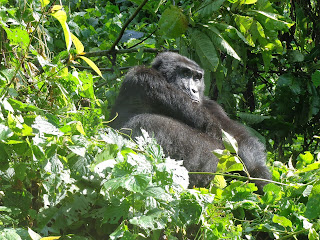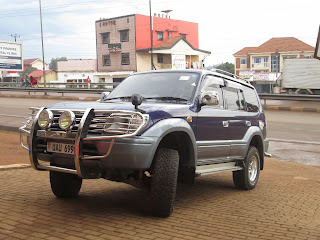Mountain Gorillas of Uganda
Uganda is delighted to be the home of mans closest relative
whom we share 95% of their genes- the gorilla. Uganda has over half of the
worlds surviving mountain gorillas that are 700 and above both male and female.
In Bwindi impenetrable national park which has almost half of them and the rest
in Mugahinga national park in the Virunga ranges that are still shared between
Uganda, Rwanda and Congo, making Uganda the largest with the only surviving
apes not only in Africa but in the world.
Gorillas are
large apes that are native to Africa mostly Uganda. The gorilla is massive,
with a short, thick trunk and broad chest and shoulders. Its eyes and ears are
dwarfed by its large head and hairless, shiny black muzzle. The arms are longer
than the stubby legs. The fully adult male mountain gorilla is twice as large
as the female.
They are typically divided into two groups. The mountain gorilla lives in the mountainous regions of bwindi and mgahinga national parks, while the lowland gorilla lives in the flat, dense forests in the same places or other. Though the two types are very similar, they have a few differences. For example, mountain gorillas tend to have longer hair, whereas lowland gorillas have short, soft hair, another difference is size. Lowland gorillas are 4 to 6 feet tall and weigh 181-200 kilograms. Mountain gorillas are about the same height, though they tend to weigh a bit more. They are 4 to 6 feet tall and weigh 220-500 kg. Animals of this size need a lot of food, and the vegetarian gorilla is no exception. Although they eat a variety of plants, favourites include wild celery, bamboo, thistles, stinging nettles, bedstraw and certain fruit. Given the rich fertile lands of the thick tropical rain forests in Uganda, These plants seem to provide sufficient moisture so that gorillas do not need water.
They are typically divided into two groups. The mountain gorilla lives in the mountainous regions of bwindi and mgahinga national parks, while the lowland gorilla lives in the flat, dense forests in the same places or other. Though the two types are very similar, they have a few differences. For example, mountain gorillas tend to have longer hair, whereas lowland gorillas have short, soft hair, another difference is size. Lowland gorillas are 4 to 6 feet tall and weigh 181-200 kilograms. Mountain gorillas are about the same height, though they tend to weigh a bit more. They are 4 to 6 feet tall and weigh 220-500 kg. Animals of this size need a lot of food, and the vegetarian gorilla is no exception. Although they eat a variety of plants, favourites include wild celery, bamboo, thistles, stinging nettles, bedstraw and certain fruit. Given the rich fertile lands of the thick tropical rain forests in Uganda, These plants seem to provide sufficient moisture so that gorillas do not need water.
Gorillas
live in groups which can range from two members to those of even up to as many
as 50 members. Groups of gorillas are called troops or bands. Though sometimes
a band consists of as few as two members, the troops are led by a dominant
male, called a silverback, which can often be identified by a gray strip of
hair on his back. Gorillas have strong attachments to members of
their own group and even when groups meet and mingle and then subsequently
part, each animal tends to remain with its respective unit. Gorillas
continually wander through their home ranges of 10 to 15 square miles, feeding
and resting throughout the day. Because gorillas are nomadic, they build new
nests each day at dusk, constructing them of bend branches in a tree or of
grasses on the ground.
The gorilla is shy and retiring
rather than ferocious and treacherous. It usually seeks no trouble unless
harassed but will valiantly defend its family group if threatened .Gorillas
scream, grab foliage and stuff it in their mouths, stand erect on their hind
legs, tear up and throw plants, drum on the chest with hands or fists, stamp
their feet, strike the ground with the palms of their hands and gallop in a
mock attack on all fours. . Gorillas can live around 35 years in the wild and
more than 50 years in zoos.
Well there
is a lot of exiting thing to know about our close relatives here in Uganda that
you will find interesting to know that is if you talk to them in person on a
Uganda safari that won’t disappoint you at all. This is worthy because they
really need to count on us.
The Bwindi
impenetrable national park and Mghahinga national parks lie south of the
country Uganda and can be accessed by road on a self drive in Uganda or guided tour in Uganda. You can also access the parks by charterd inbound aeroplanes
that start from Entebbe and land in kisoro. You can plan to have your car
rental in Uganda down in kisoro or start off the drive right from kampala or Entebbe,
all depends on your arrangement with your car rental agency in Uganda.
Either
driving by road on a self drive in Uganda or guided/chauffeur driven, the drive
through the rolling hills of kabala will enrich you with real Africa. You got a
chance to go through the equator and great scenery awaiting you. Preferably spice
up your adventure to the gorilla tracking experience with the best adventure to
the pearl of Africa.





Comments
Post a Comment